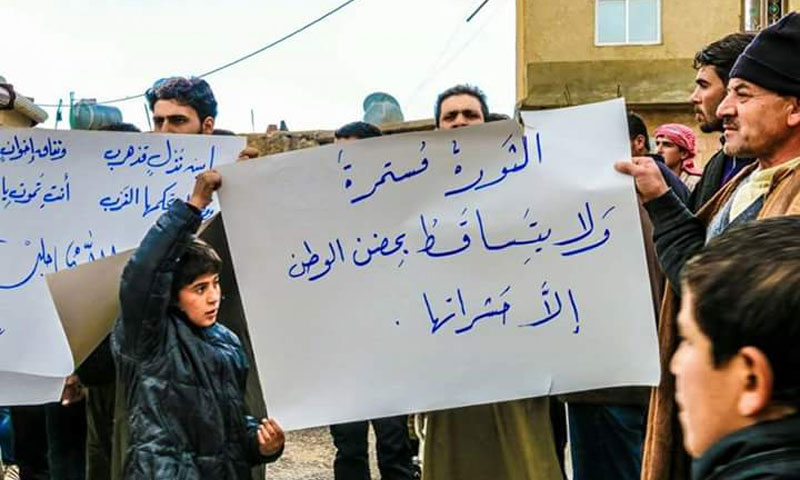



Enab Baladi – Idlib
“If you aren’t homeless and looking for shelter, you might be a poor person looking for food for your children. If you aren’t poor, you will be under bombardment and that’s enough to make you anxious, to make you conscious in a state of unconsciousness, escaping from death or wishing for it, you don’t know. Every Syrian is facing at least one of these things, or maybe all of them. What revolution are we talking about?”, said Samer Zakaria, while smoking.
Samer, in his fifties, is a father of a martyr and of a prisoner. He fled with his family from Hama to Idlib three years ago to avoid being arrested. He represents a large segment of Syrians and was able, through his simple words, to sum up what some Syrians are suffering, especially after the regime’s advancement in the major opposition strongholds and in the cradle of the revolution, the city of Aleppo.
Last week, al-Assad’s forces and allied militias seized control of all districts of the northern part of eastern Aleppo, with the opposition losing 40% of areas under its control.
Khalid al-Muhajir, a media activist in the countryside of Idlib, spoke to Enab Baladi about the reasons that made people forget the revolution. He said, “When people took to the streets in 2011, almost everyone was satisfied with their life, to some extent. The majority thought that it would be a temporary phase that would come to an end. No one cared about the obstacles. The regime would soon fall and then we would reorganize everything”.
“But it did not end and it became an armed struggle. The fear of displacement became a reality and people began to lose all that they had saved. It became necessary to give more importance to the standard of living. As for the role of Bashar al-Assad, people were thinking of ways to live and guarantee their daily needs, far from politics. Now, in addition to the revolution, the difficulties of daily life have made things even worse. You can ask those who said in the past, “The people want (the fall of the regime)”, they will tell you a loaf of bread costs 200 Liras”, Khalid added.
The proliferation of factions, their flags and their ideological goals were one of the main reasons that led to the loss of the main goal of the revolution, especially due to the infighting between these factions. This is in addition to the regime attacks that have forced the opposition to retreay, losing a number of areas, including Aleppo.
“The protests were unified under one flag, which is the revolution. Today, every 100 people have their own flag and fight whoever is against their opinion. People are not like they were before, their reality is collapsing just like their homes. Add to that the Islamic, secular, democratic and other trends that made people feel lost”, said Khalid.
In short, most people are no longer connected to each other. The undeniable reality is that their main concern is to live in safety and security and find their next meal.
Mohammed al-Helou, a fighter in the ranks of one of the opposition factions, has an opposing perspective. He said, “The revolution, in its literal understanding, is a principle that no one can abandon, regardless of what they go through. It is neither limited to opposition to a certain party nor linked to a particular goal. It began with a call for dignity and for exposing the despotic leader, but it turned into defending the land and honor. The revolution is a revolution in everything, against those who stand in the face of truth. People revolting against the factions and calling for them to unite is a revolution. The revolution was and still is in the heart of every honest person who doesn’t have any selfish goals.”
Different parts of the province of Idlib have witnessed frequent protests over the past month calling for the factions to unite under one flag, to support Aleppo and stop their infighting. “If something weakens or deteriorates, it doesn’t mean it is dead, and that’s how people consider the revolution”, said Zayd Hallak, one of the residents of Taftanaz in Idlib. He asserted, “People revolted despite knowing the brutality of the regime. What happened in Hama in 1982 was enough to show people what al-Assad might do. Nevertheless, they revolted and fought.”
Hallak considers that it is normal to find phases where people’s concerns and worries make them retreat a little bit but the revolution is still in people’s hearts. In his view, the Syrian people have shown that they are revolutionary and that they will not abandon their goal of overthrowing the regime and all its figures.
According to Hallak, the biggest obstacle in the face of the revolution is the conflict between the factions. It is obvious today that “renewing” the revolution requires an uprising that calls for all the factions to return to the primary aim, away from titles and flags.
The revolution might weaken but it never dies. This is the conclusion that can be drawn from speaking to people here in Idlib. Even though its goals have not been reached, it is present within every Syrian who suffered from the repression of the regime and from its attacks over the past six years.
if you think the article contain wrong information or you have additional details Send Correction